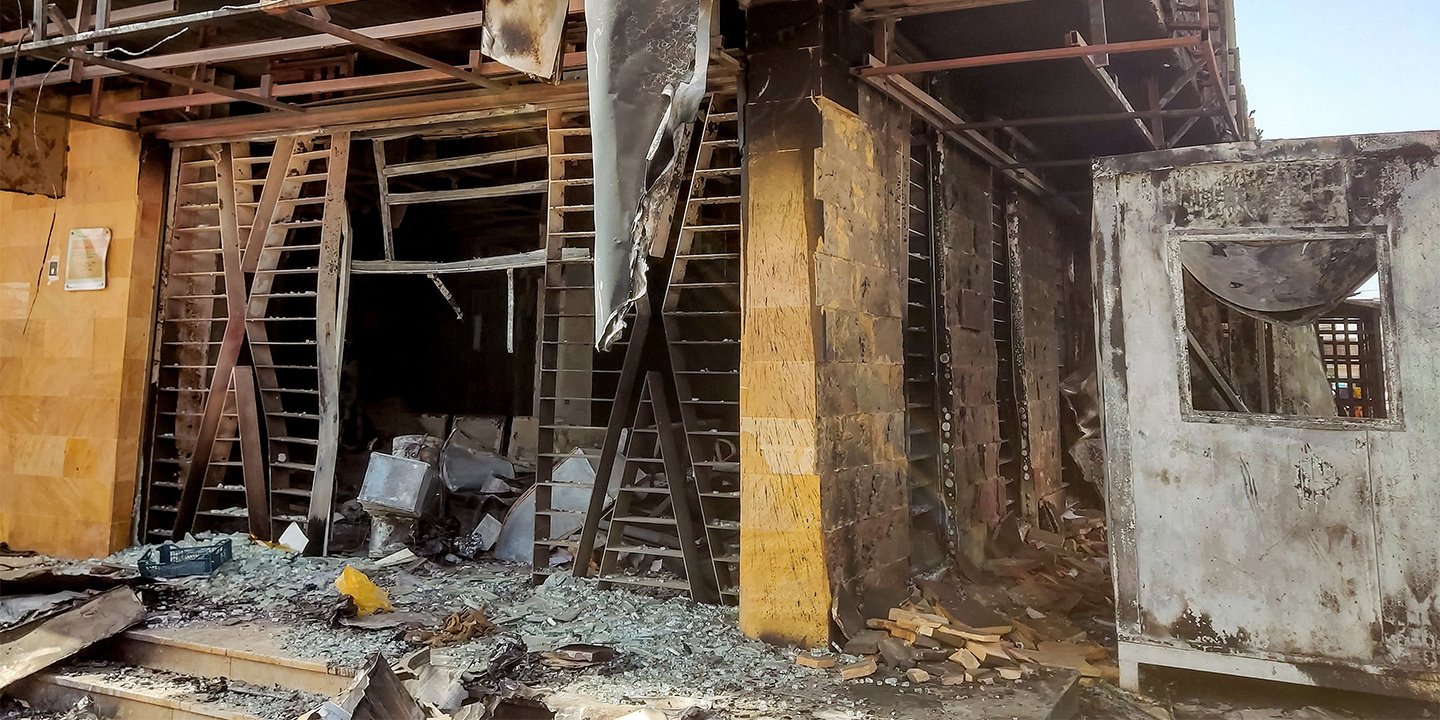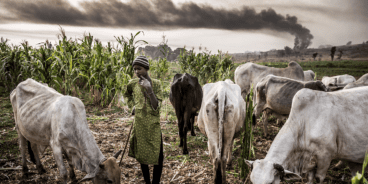

Atrocity Alert No. 352: Sudan, Afghanistan and International Day for Countering Hate Speech
Atrocity Alert is a weekly publication by the Global Centre for the Responsibility to Protect highlighting situations where populations are at risk of, or are enduring, mass atrocity crimes.
IMMINENT RISK OF ATROCITY CRIMES IN SUDAN AS VIOLENCE ESCALATES IN DARFUR
As intense fighting between the Sudanese Armed Forces (SAF) and Rapid Support Forces (RSF) enters its third month, the conflict has triggered an alarming escalation in inter-communal and ethnically motivated violence in various parts of Sudan, particularly in the Darfur region. The RSF and Arab affiliated militias have rampaged through the city of El Geneina, killing at least 1,100 people, predominantly from the non-Arab Massalit community, since late April. Despite a near shutdown in telecommunications, a growing body of witness testimonies, verified social media videos and satellite imagery now show the scale of horrific events taking place across Darfur. Various UN officials raised alarm about the ethnic dimensions of the conflict in West Darfur, alerting that these attacks may amount to crimes against humanity and war crimes.
Among the people killed in El Geneina was the West Darfur governor, Khamis Abbakar, whose body was found on 14 June. He was killed hours after he publicly accused the RSF and allied militia of committing genocide and attacking civilians. On 16 June UN High Commissioner for Human Rights, Volker Türk, said he was “appalled” by the killing and expressed deep concern about growing hate speech, particularly against the Massalit community as “it could further inflame tensions.”
According to the International Organization for Migration, intense fighting has resulted in 298,200 people displaced in West Darfur. An estimated 155,015 Sudanese have also sought refuge in Chad. Médecins Sans Frontières reported on 16 June that at least 622 injured patients – mostly with gunshot wounds – have been brought into Chad’s Adré hospital in the preceding three days alone.
On 19 June UN Secretary-General António Guterres emphasized, “The scale and speed of Sudan’s descent into death and destruction is unprecedented.” The Armed Conflict Location and Event Data Project estimates that the death toll as result of the fighting across Sudan has surpassed 2,000 people. While negotiations for a permanent ceasefire are ongoing, intense fighting between the SAF and RSF also continues in Khartoum. On Saturday, 17 June, airstrikes in residential areas killed at least 17 civilians, including five children. One day earlier the SAF’s Deputy Army Chief, Yasser Atta, warned civilians to stay away from houses with RSF fighters, because the army “will attack them at any time.”
The situation in Sudan requires an immediate and urgent response by the international community. The UN Security Council (UNSC) must convene an emergency meeting to discuss the escalating situation in Darfur and invite the UN Office on Genocide Prevention and the Responsibility to Protect to brief on the atrocity risks vulnerable populations are facing. The UNSC, together with the African Union and states that have leverage over the warring parties, such as Egypt and Saudi Arabia, should devise a strategy on how to effectively protect civilians in Darfur and throughout Sudan.
PERSECUTION OF WOMEN AND GIRLS IN AFGHANISTAN “UNPARALLELED GLOBALLY”
Women and girls in Afghanistan are subject to extreme forms of gender-based discrimination perpetrated by the Taliban, according to a joint report presented to the UN Human Rights Council on 19 June by the UN Special Rapporteur on the situation of human rights in Afghanistan and the UN Working Group on discrimination against women and girls.
The Special Rapporteur and Working Group emphasize that this extreme gender-based discrimination is “unparalleled globally.” They further assessed that, “Women and girls in Afghanistan are experiencing severe discrimination that may amount to gender persecution – a crime against humanity – and be characterised as gender apartheid, as the de facto authorities appear to be governing by systemic discrimination with the intention to subject women and girls to total domination.” Gender apartheid is not currently a crime under the Rome Statute of the International Criminal Court (ICC); however, it is understood as a framing lens for inhumane acts committed in the context of an institutionalized regime of systematic oppression and domination by one gender group over another.
According to the report, women and girls endure an oppressive environment – with limited to no ability to participate in public and daily life – because of the denial of access to education beyond the primary level, a mandatory maharam (male chaperone) policy and a ban on working outside the home in most sectors. The Taliban de facto authorities impose restrictive edicts and deny women and girls their fundamental rights, including rights to education, work, freedom of movement, freedom of opinion and expression and healthcare. The discriminatory and restrictive environment faced by women and girls in Afghanistan is further exacerbated as victims of gender-based violence endure physical and psychological suffering with limited access to any protection services. Moreover, legal protections and accountability mechanisms for gender-based violence have been abolished.
During the enhanced interactive dialogue on the report, Nada Al-Nashif, UN Deputy High Commissioner for Human Rights, stated, “The Taliban have eliminated girls’ development opportunities and therefore, their ability to live independently, now and in the future has been debilitated, affecting generations to come.” Deputy High Commissioner Al-Nashif also emphasized that Afghanistan is the only country in the world that bans women from working for international organizations, including the UN.
In line with the recommendations made in the joint report, the Taliban de facto authorities must ensure compliance with all of Afghanistan’s international human rights obligations, remove all discriminatory edicts that specifically target women and girls, and actively ensure their enjoyment of all fundamental rights, as well as participation in public and daily life. UN member states should support all justice-seeking efforts for Afghan women and girls, including through the ICC and the International Court of Justice.
INTERNATIONAL DAY FOR COUNTERING HATE SPEECH
On 18 June the international community marked the International Day for Countering Hate Speech, raising awareness about the dangers of incitement and hate speech and showcasing good practices to prevent and end it. UN Secretary-General António Guterres stressed, “Hate speech is used to stoke fear and division, often for political gain, and at immense cost to communities and societies. It incites violence, exacerbates tensions, and impedes efforts to foster mediation and dialogue. It is one of the warning signs of genocide and other atrocity crimes.”
Inflammatory rhetoric or hate speech targeting people on the basis of their identity creates an environment conducive for the potential commission of atrocity crimes. Hate speech frequently targets vulnerable and/or marginalized groups, such as ethnic and religious minorities, women, refugees, migrants, and people of diverse sexual orientation and gender identities. Such dangerous speech has the potential to influence people to accept, condone or commit violence against targeted groups.
Throughout history hate speech has been a precursor for atrocities in myriad situations, from Rwanda to Bosnia, South Sudan to Myanmar (Burma) and from Ethiopia to Sri Lanka, among others. While in the past dangerous speech has notoriously been spread via print and radio media, as well as in speeches by politicians and other eminent figures, in recent years social media platforms have also been weaponized to spread hate speech and incitement with unprecedented reach and speed.
On 9 June the Office of the UN High Commissioner for Human Rights (OHCHR) expressed alarm regarding the disappearance of 16 individuals from the Baháʼí faith community and a subsequent sermon by the Houthi Grand Mufti in Sana’a, Yemen, that violently targeted Baháʼís. During the sermon, the Mufti accused the detained people of being traitors and called on militias to unite against the beliefs that Bahá’ís uphold. For several years Baháʼís and members of other religious minorities in Yemen have faced detention, torture and ill-treatment, with some victims being sentenced to death for professing their religion. According to OHCHR, violations against religious or belief minorities in Yemen are exacerbated by hate speech that may amount to incitement to hatred, hostility and discrimination.
The annual commemoration of International Day for Countering Hate Speech builds on the UN Strategy and Plan of Action on Hate Speech launched by Secretary-General Guterres on 18 June 2019. Ahead of this year’s commemoration, on 14 June the UN Security Council unanimously adopted Resolution 2686, which recognizes that hate speech, racism, racial discrimination, xenophobia, intolerance, gender discrimination and acts of extremism can contribute to conflict. The resolution urges member states to publicly condemn violence, hate speech and extremism and encourages them to prevent the spread of intolerant ideology and incitement to hatred.
Related Content


Atrocity Alert No. 444: Nigeria, Haiti and South Sudan
